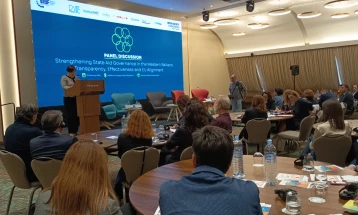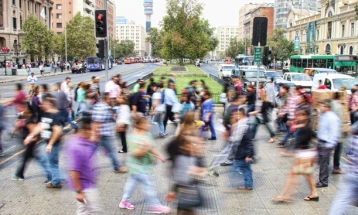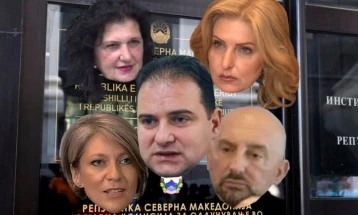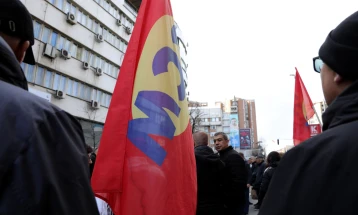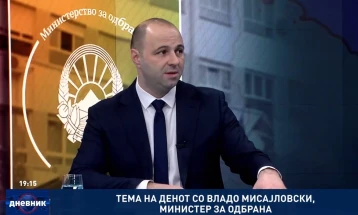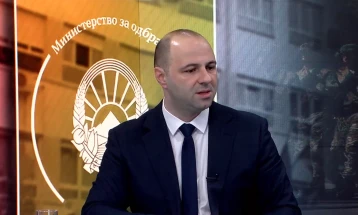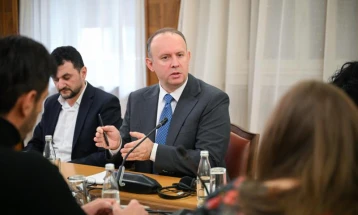On purpose or unintentionally, disabled people fall victim to hate speech
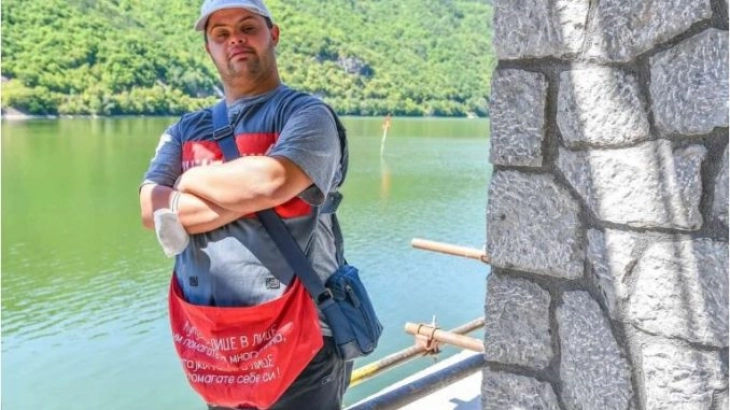
Struga, 4 October 2021 (MIA) – At work, at the market, and on the streets. Disabled people face hate speech every day. Some do it purposefully, others do it accidentally by using words that can hurt these people’s feelings. Insane, retarded, mental case, idiot, imbecile... these are just some of the words we use without worrying about hurting someone.
Hate speech in this country leads to prison time from one to five years, but it’s acceptable behavior in practice. Hate speech is not a felony in and of itself, but it’s regulated from a criminal aspect, according to multiple elements in the Criminal Code.
Alongside the use of offensive words towards disabled people, their effort and abilities are also devalued. They often don’t get employed, or if they do, they get employed out of pity and they’re not given work tasks because the employers don’t think they’re capable of completing them. Igor Shajnovski, person with Down syndrome, who was promised multiple jobs, he got them, but he wasn’t given tasks. He’s employed at the Center for the Improvement of the Quality of Life for People with Intellectual Disabilities “Poraka Nova” where he sells the street magazine Lice V Lice (Face to Face) and he’s performing his job dutifully.
 Igor Shajnovski, person with Down syndrome, raises awareness against hate speech
32-year-old Igor Shajovski from the village Radozhda near Struga has Down syndrome, and he’s well known to the public for his record-breaking sales of the street magazine Lice V Lice. He believes that civil awareness of hate speech should be elevated on a local and a state level.
“Let’s show everyone that we do real work and we’re capable of working. I contribute to the family budget by selling this street magazine, and I’m happy to be working,” Igor says.
He says that politicians should work towards civil awareness and reducing hate speech towards everyone, not just vulnerable categories.
Igor makes an honest living, and his disability doesn’t give anyone the right to be rude and degrading.
When he sells the magazine, he politely approaches potential buyers presenting part of the contents, but he’s often met with unpleasantness. Some people tell him to leave right away, with the excuse that there’s a pandemic, but some people treat him badly. He says that there are those who buy the magazine and ask to take a picture with him, or offer him a drink, which motivates him to keep going.
When he’s attacked with hate speech, he says that he bites his tongue and goes away, but there had been times that he couldn’t suppress his anger, which he quietly unloads by punching the magazine or a table.
“When I want to present the magazine to someone, if they interrupt me, I keep talking so that they hear me out. Some people buy the magazine, but other people just relentlessly try to insult me. I control myself from arguing back and I just hit the magazine or a table as a way to slowly let my anger out,” Shajnovski says.
Igor Shajnovski, person with Down syndrome, raises awareness against hate speech
32-year-old Igor Shajovski from the village Radozhda near Struga has Down syndrome, and he’s well known to the public for his record-breaking sales of the street magazine Lice V Lice. He believes that civil awareness of hate speech should be elevated on a local and a state level.
“Let’s show everyone that we do real work and we’re capable of working. I contribute to the family budget by selling this street magazine, and I’m happy to be working,” Igor says.
He says that politicians should work towards civil awareness and reducing hate speech towards everyone, not just vulnerable categories.
Igor makes an honest living, and his disability doesn’t give anyone the right to be rude and degrading.
When he sells the magazine, he politely approaches potential buyers presenting part of the contents, but he’s often met with unpleasantness. Some people tell him to leave right away, with the excuse that there’s a pandemic, but some people treat him badly. He says that there are those who buy the magazine and ask to take a picture with him, or offer him a drink, which motivates him to keep going.
When he’s attacked with hate speech, he says that he bites his tongue and goes away, but there had been times that he couldn’t suppress his anger, which he quietly unloads by punching the magazine or a table.
“When I want to present the magazine to someone, if they interrupt me, I keep talking so that they hear me out. Some people buy the magazine, but other people just relentlessly try to insult me. I control myself from arguing back and I just hit the magazine or a table as a way to slowly let my anger out,” Shajnovski says.
 His mentor, Stefan Maleski, says that Igor was raised to be calm and respectful. When he faces an attitude opposite to what he’s used to in his family and the Poraka Nova team, he tries to overcome it.
“I admire how calm and collected he is. He’s very patient. We talk often, I explain to him that everyone is different and doesn’t react the same way to things,” Maleski says.
In their everyday communication with people in the field, he says that they’re trying to raise awareness that Igor is a salesman offering a quality product that has a double benefit – supporting his work and the quality content the magazine has to offer.
Poraka Nova’s secretary Anita Gagoska also talked about Igor’s professionalism and high degree of tolerance. She mentioned an example of when Igor offered the magazine to two women, who rudely told him to “get out of their faces”. After they sat near the two women, they asked Anita what the “kid” is selling, and Shajnovski got up and calmly presented them the magazine.
“A lot of us can envy his etiquette and behavior, as well as his composure and the amount of respect he has for every human. What do we do in return? We just sit here, burdened by prejudice and stereotypes,” Gagoska concludes.
Traditional speech terms have consequences
Gagoska notices that we all use offensive words in our everyday communication, even subconsciously, that can affect disabled people. She conducted research regarding the terms that we use in everyday speech, and the most often used words are: idiot, insane, retarded, mental case, imbecile, moron etc.
“We should be aware of the terms we use when talking to friends and family, but also strangers. Insane, retarded, idiot – these terms are directly related to disabled people and are likely the byproduct of our traditional way of speaking, and they’re now a negative heritage, but they’re much deeper and their consequences are far-reaching,” Gagoska says.
She’s faced and witnessed hate-speech firsthand while working with disabled people.
“There are situations on social media in which the parents of disabled people are so loud and offensive with their use of hate speech towards others. Even we, the people working with them, are often the targets of hate speech by the families of disabled people,” Gagoska says.
Not every disabled person faces hate speech. Orhideja Topencharova, the mother of a child with intellectual disabilities, says that her 39-year-old daughter is constantly in their presence and that they haven’t faced hate speech once.
“Our child hasn’t been the target of hate speech, neither in the streets or the shops, no one has ever said anything inappropriate. My daughter is in our care 24/7 and people just want to cater to her,” Topencharova says, happy with the institutions and the way her child has been treated.
Hate speech in the inclusion of disabled people in the education system
Hate speech occurs when we talk about the application of the Law on Primary Education, in the part concerning the inclusion of disabled people in the education system by the parents and children alike.
Special educator at the “Brakja Miladinovci” Elementary School in Struga, Sonja Madzoska, who is also special educator at Poraka Nova, as well as its president, says that she works with seven children with various degrees of disability in a special classroom. In her 20 years of experience working with disabled people, she says that there hasn’t been much of an effect to prevent hate speech based on a personal characteristic, despite numerous attempts.
“It hurts me when I hear hate speech towards my pupils just because they’re disabled. I practically have no support from my colleagues when facing this matter. I’ve heard all sorts of insults by my colleagues, like when they say they can’t put up with the parents dropping off their disabled children, how our classroom smells weird, they don’t even want to come inside,” Madzoska says.
Inclusion in their case is the mere fact that they’re in the same school as children with typical development.
“We face insults and hate speech often, and we’re kind of used to it by now. We see it in the way we get support for different events. Students with typical development even fear disabled students, and for that, I blame society. We face limited information by parents and teachers, as well,” Madzoska says.
Slagjana Stojkova Kostoski
Translated by Dragana Knezhevikj
This story was created in collaboration with Lice V Lice Magazine as part of the project titled “Resistance towards misinformation and hate speech: Action taken by the civil society to reaffirm media freedom and preventing misinformation and hate-spreading propaganda in the countries of the Western Balkans and Turkey”
His mentor, Stefan Maleski, says that Igor was raised to be calm and respectful. When he faces an attitude opposite to what he’s used to in his family and the Poraka Nova team, he tries to overcome it.
“I admire how calm and collected he is. He’s very patient. We talk often, I explain to him that everyone is different and doesn’t react the same way to things,” Maleski says.
In their everyday communication with people in the field, he says that they’re trying to raise awareness that Igor is a salesman offering a quality product that has a double benefit – supporting his work and the quality content the magazine has to offer.
Poraka Nova’s secretary Anita Gagoska also talked about Igor’s professionalism and high degree of tolerance. She mentioned an example of when Igor offered the magazine to two women, who rudely told him to “get out of their faces”. After they sat near the two women, they asked Anita what the “kid” is selling, and Shajnovski got up and calmly presented them the magazine.
“A lot of us can envy his etiquette and behavior, as well as his composure and the amount of respect he has for every human. What do we do in return? We just sit here, burdened by prejudice and stereotypes,” Gagoska concludes.
Traditional speech terms have consequences
Gagoska notices that we all use offensive words in our everyday communication, even subconsciously, that can affect disabled people. She conducted research regarding the terms that we use in everyday speech, and the most often used words are: idiot, insane, retarded, mental case, imbecile, moron etc.
“We should be aware of the terms we use when talking to friends and family, but also strangers. Insane, retarded, idiot – these terms are directly related to disabled people and are likely the byproduct of our traditional way of speaking, and they’re now a negative heritage, but they’re much deeper and their consequences are far-reaching,” Gagoska says.
She’s faced and witnessed hate-speech firsthand while working with disabled people.
“There are situations on social media in which the parents of disabled people are so loud and offensive with their use of hate speech towards others. Even we, the people working with them, are often the targets of hate speech by the families of disabled people,” Gagoska says.
Not every disabled person faces hate speech. Orhideja Topencharova, the mother of a child with intellectual disabilities, says that her 39-year-old daughter is constantly in their presence and that they haven’t faced hate speech once.
“Our child hasn’t been the target of hate speech, neither in the streets or the shops, no one has ever said anything inappropriate. My daughter is in our care 24/7 and people just want to cater to her,” Topencharova says, happy with the institutions and the way her child has been treated.
Hate speech in the inclusion of disabled people in the education system
Hate speech occurs when we talk about the application of the Law on Primary Education, in the part concerning the inclusion of disabled people in the education system by the parents and children alike.
Special educator at the “Brakja Miladinovci” Elementary School in Struga, Sonja Madzoska, who is also special educator at Poraka Nova, as well as its president, says that she works with seven children with various degrees of disability in a special classroom. In her 20 years of experience working with disabled people, she says that there hasn’t been much of an effect to prevent hate speech based on a personal characteristic, despite numerous attempts.
“It hurts me when I hear hate speech towards my pupils just because they’re disabled. I practically have no support from my colleagues when facing this matter. I’ve heard all sorts of insults by my colleagues, like when they say they can’t put up with the parents dropping off their disabled children, how our classroom smells weird, they don’t even want to come inside,” Madzoska says.
Inclusion in their case is the mere fact that they’re in the same school as children with typical development.
“We face insults and hate speech often, and we’re kind of used to it by now. We see it in the way we get support for different events. Students with typical development even fear disabled students, and for that, I blame society. We face limited information by parents and teachers, as well,” Madzoska says.
Slagjana Stojkova Kostoski
Translated by Dragana Knezhevikj
This story was created in collaboration with Lice V Lice Magazine as part of the project titled “Resistance towards misinformation and hate speech: Action taken by the civil society to reaffirm media freedom and preventing misinformation and hate-spreading propaganda in the countries of the Western Balkans and Turkey”
 Igor Shajnovski, person with Down syndrome, raises awareness against hate speech
32-year-old Igor Shajovski from the village Radozhda near Struga has Down syndrome, and he’s well known to the public for his record-breaking sales of the street magazine Lice V Lice. He believes that civil awareness of hate speech should be elevated on a local and a state level.
“Let’s show everyone that we do real work and we’re capable of working. I contribute to the family budget by selling this street magazine, and I’m happy to be working,” Igor says.
He says that politicians should work towards civil awareness and reducing hate speech towards everyone, not just vulnerable categories.
Igor makes an honest living, and his disability doesn’t give anyone the right to be rude and degrading.
When he sells the magazine, he politely approaches potential buyers presenting part of the contents, but he’s often met with unpleasantness. Some people tell him to leave right away, with the excuse that there’s a pandemic, but some people treat him badly. He says that there are those who buy the magazine and ask to take a picture with him, or offer him a drink, which motivates him to keep going.
When he’s attacked with hate speech, he says that he bites his tongue and goes away, but there had been times that he couldn’t suppress his anger, which he quietly unloads by punching the magazine or a table.
“When I want to present the magazine to someone, if they interrupt me, I keep talking so that they hear me out. Some people buy the magazine, but other people just relentlessly try to insult me. I control myself from arguing back and I just hit the magazine or a table as a way to slowly let my anger out,” Shajnovski says.
Igor Shajnovski, person with Down syndrome, raises awareness against hate speech
32-year-old Igor Shajovski from the village Radozhda near Struga has Down syndrome, and he’s well known to the public for his record-breaking sales of the street magazine Lice V Lice. He believes that civil awareness of hate speech should be elevated on a local and a state level.
“Let’s show everyone that we do real work and we’re capable of working. I contribute to the family budget by selling this street magazine, and I’m happy to be working,” Igor says.
He says that politicians should work towards civil awareness and reducing hate speech towards everyone, not just vulnerable categories.
Igor makes an honest living, and his disability doesn’t give anyone the right to be rude and degrading.
When he sells the magazine, he politely approaches potential buyers presenting part of the contents, but he’s often met with unpleasantness. Some people tell him to leave right away, with the excuse that there’s a pandemic, but some people treat him badly. He says that there are those who buy the magazine and ask to take a picture with him, or offer him a drink, which motivates him to keep going.
When he’s attacked with hate speech, he says that he bites his tongue and goes away, but there had been times that he couldn’t suppress his anger, which he quietly unloads by punching the magazine or a table.
“When I want to present the magazine to someone, if they interrupt me, I keep talking so that they hear me out. Some people buy the magazine, but other people just relentlessly try to insult me. I control myself from arguing back and I just hit the magazine or a table as a way to slowly let my anger out,” Shajnovski says.
 His mentor, Stefan Maleski, says that Igor was raised to be calm and respectful. When he faces an attitude opposite to what he’s used to in his family and the Poraka Nova team, he tries to overcome it.
“I admire how calm and collected he is. He’s very patient. We talk often, I explain to him that everyone is different and doesn’t react the same way to things,” Maleski says.
In their everyday communication with people in the field, he says that they’re trying to raise awareness that Igor is a salesman offering a quality product that has a double benefit – supporting his work and the quality content the magazine has to offer.
Poraka Nova’s secretary Anita Gagoska also talked about Igor’s professionalism and high degree of tolerance. She mentioned an example of when Igor offered the magazine to two women, who rudely told him to “get out of their faces”. After they sat near the two women, they asked Anita what the “kid” is selling, and Shajnovski got up and calmly presented them the magazine.
“A lot of us can envy his etiquette and behavior, as well as his composure and the amount of respect he has for every human. What do we do in return? We just sit here, burdened by prejudice and stereotypes,” Gagoska concludes.
Traditional speech terms have consequences
Gagoska notices that we all use offensive words in our everyday communication, even subconsciously, that can affect disabled people. She conducted research regarding the terms that we use in everyday speech, and the most often used words are: idiot, insane, retarded, mental case, imbecile, moron etc.
“We should be aware of the terms we use when talking to friends and family, but also strangers. Insane, retarded, idiot – these terms are directly related to disabled people and are likely the byproduct of our traditional way of speaking, and they’re now a negative heritage, but they’re much deeper and their consequences are far-reaching,” Gagoska says.
She’s faced and witnessed hate-speech firsthand while working with disabled people.
“There are situations on social media in which the parents of disabled people are so loud and offensive with their use of hate speech towards others. Even we, the people working with them, are often the targets of hate speech by the families of disabled people,” Gagoska says.
Not every disabled person faces hate speech. Orhideja Topencharova, the mother of a child with intellectual disabilities, says that her 39-year-old daughter is constantly in their presence and that they haven’t faced hate speech once.
“Our child hasn’t been the target of hate speech, neither in the streets or the shops, no one has ever said anything inappropriate. My daughter is in our care 24/7 and people just want to cater to her,” Topencharova says, happy with the institutions and the way her child has been treated.
Hate speech in the inclusion of disabled people in the education system
Hate speech occurs when we talk about the application of the Law on Primary Education, in the part concerning the inclusion of disabled people in the education system by the parents and children alike.
Special educator at the “Brakja Miladinovci” Elementary School in Struga, Sonja Madzoska, who is also special educator at Poraka Nova, as well as its president, says that she works with seven children with various degrees of disability in a special classroom. In her 20 years of experience working with disabled people, she says that there hasn’t been much of an effect to prevent hate speech based on a personal characteristic, despite numerous attempts.
“It hurts me when I hear hate speech towards my pupils just because they’re disabled. I practically have no support from my colleagues when facing this matter. I’ve heard all sorts of insults by my colleagues, like when they say they can’t put up with the parents dropping off their disabled children, how our classroom smells weird, they don’t even want to come inside,” Madzoska says.
Inclusion in their case is the mere fact that they’re in the same school as children with typical development.
“We face insults and hate speech often, and we’re kind of used to it by now. We see it in the way we get support for different events. Students with typical development even fear disabled students, and for that, I blame society. We face limited information by parents and teachers, as well,” Madzoska says.
Slagjana Stojkova Kostoski
Translated by Dragana Knezhevikj
This story was created in collaboration with Lice V Lice Magazine as part of the project titled “Resistance towards misinformation and hate speech: Action taken by the civil society to reaffirm media freedom and preventing misinformation and hate-spreading propaganda in the countries of the Western Balkans and Turkey”
His mentor, Stefan Maleski, says that Igor was raised to be calm and respectful. When he faces an attitude opposite to what he’s used to in his family and the Poraka Nova team, he tries to overcome it.
“I admire how calm and collected he is. He’s very patient. We talk often, I explain to him that everyone is different and doesn’t react the same way to things,” Maleski says.
In their everyday communication with people in the field, he says that they’re trying to raise awareness that Igor is a salesman offering a quality product that has a double benefit – supporting his work and the quality content the magazine has to offer.
Poraka Nova’s secretary Anita Gagoska also talked about Igor’s professionalism and high degree of tolerance. She mentioned an example of when Igor offered the magazine to two women, who rudely told him to “get out of their faces”. After they sat near the two women, they asked Anita what the “kid” is selling, and Shajnovski got up and calmly presented them the magazine.
“A lot of us can envy his etiquette and behavior, as well as his composure and the amount of respect he has for every human. What do we do in return? We just sit here, burdened by prejudice and stereotypes,” Gagoska concludes.
Traditional speech terms have consequences
Gagoska notices that we all use offensive words in our everyday communication, even subconsciously, that can affect disabled people. She conducted research regarding the terms that we use in everyday speech, and the most often used words are: idiot, insane, retarded, mental case, imbecile, moron etc.
“We should be aware of the terms we use when talking to friends and family, but also strangers. Insane, retarded, idiot – these terms are directly related to disabled people and are likely the byproduct of our traditional way of speaking, and they’re now a negative heritage, but they’re much deeper and their consequences are far-reaching,” Gagoska says.
She’s faced and witnessed hate-speech firsthand while working with disabled people.
“There are situations on social media in which the parents of disabled people are so loud and offensive with their use of hate speech towards others. Even we, the people working with them, are often the targets of hate speech by the families of disabled people,” Gagoska says.
Not every disabled person faces hate speech. Orhideja Topencharova, the mother of a child with intellectual disabilities, says that her 39-year-old daughter is constantly in their presence and that they haven’t faced hate speech once.
“Our child hasn’t been the target of hate speech, neither in the streets or the shops, no one has ever said anything inappropriate. My daughter is in our care 24/7 and people just want to cater to her,” Topencharova says, happy with the institutions and the way her child has been treated.
Hate speech in the inclusion of disabled people in the education system
Hate speech occurs when we talk about the application of the Law on Primary Education, in the part concerning the inclusion of disabled people in the education system by the parents and children alike.
Special educator at the “Brakja Miladinovci” Elementary School in Struga, Sonja Madzoska, who is also special educator at Poraka Nova, as well as its president, says that she works with seven children with various degrees of disability in a special classroom. In her 20 years of experience working with disabled people, she says that there hasn’t been much of an effect to prevent hate speech based on a personal characteristic, despite numerous attempts.
“It hurts me when I hear hate speech towards my pupils just because they’re disabled. I practically have no support from my colleagues when facing this matter. I’ve heard all sorts of insults by my colleagues, like when they say they can’t put up with the parents dropping off their disabled children, how our classroom smells weird, they don’t even want to come inside,” Madzoska says.
Inclusion in their case is the mere fact that they’re in the same school as children with typical development.
“We face insults and hate speech often, and we’re kind of used to it by now. We see it in the way we get support for different events. Students with typical development even fear disabled students, and for that, I blame society. We face limited information by parents and teachers, as well,” Madzoska says.
Slagjana Stojkova Kostoski
Translated by Dragana Knezhevikj
This story was created in collaboration with Lice V Lice Magazine as part of the project titled “Resistance towards misinformation and hate speech: Action taken by the civil society to reaffirm media freedom and preventing misinformation and hate-spreading propaganda in the countries of the Western Balkans and Turkey” 